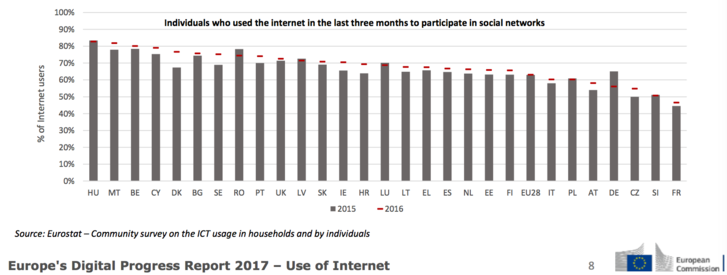Change language:
Hungary, the most socially networked country in the European Union

According to ozy.com, it would be a misconception to think that the most devoted social media users come from Germany or Finland. In the mind of most of us, we have a great utopia in connection with these countries from where technological advances start and probably, we would guess that actually they are in leading position.
Instead, it is like a bolt from the blue to get the information that it is Hungary, the home of goulash soup and George Soros where the most eager network users live. According to the recent study, 83% of the Hungarian Internet users reveal that they are on social media as well, that is considered to be the highest rate in whole Europe. Indeed, the study (.pdf) on Digital Economy and Society in the EU conducted by Eurostat highlights that it is 20% more than the average of the EU. This is not the only study, however, that offers unanticipated results. The same survey with 6,018 Hungarian participants reported an enormously high rate (97%) of Hungarian people between the ages 16-24 who are on social media networks of different types. This high percentage is in competition for the 1st place with the similar results-produced countries like Belgium and Denmark.

Anyway, this news probably amazes people at 1st sight. The reason for this suprising result might root in the history of Hungary. Eva Bognar, a senior programme officer at the Central European University’s Center for Media, Data and Society pointed out that
the severe communist rule in the late 20th century can be put to blame for making people turn away from the legitimized structures and public life towards their own private social networks.
The programme officer further added that the examination of this issue is the subject of studies done by social historians who investigate the prominence of these personal circles as opposed to institutions.
Under the presidency of the Prime Minister, Viktor Orbán, the government has become more and more domineering that does not facilitate the inhabitants’ situation. Furthermore, openly talking about politics is not considered to be allowed, thus people turn their attention towards reviews of movies or video games on YouTube. The usage of video-sharing services was examined separately which result shows that 68% of Hungarians, whose age varies between 16-74, find pleasure in the likes of YouTube. Gergely Szirmai, a Hungarian entertainment news video blogger, believes that
“there is a lot of need for escapism here in Hungary and social media provides that with great efficacy.”
It is not only history that provides an explanation for the astonishing results but a pre-version of what is now the thriving network of Facebook founded by Mark Zuckerberg. iWiW, the Hungarian website predecessor of Facebook, was introduced to the public in 2002 that allowed people to chat with their friends and make acquaintances. Its success is shown by the fact that by the late 2000s, several million users have joined to this online community. Gábor Gerényi, the founder of Index.hu, one of the most-read news site of the country, reported that the birth of the social network did not originate form here, but previously founded online forums also helped to make the ground for today’s leading country in social network. He further remarks that Hungary was already strong in social media before Web 2.0.
The recent results also provide evidence that a small country can achieve remarkable results in unexpected domains where people’s unity and belonging together may be the most perceptible through social networks.
Photos: pixabay.com; ec.europa.eu/eurostat
Source: ozy.com







